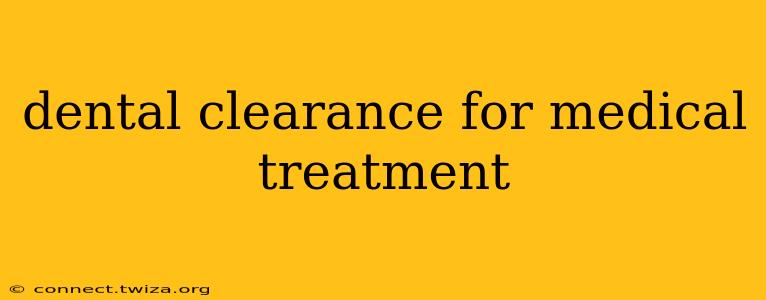Getting medical treatment often requires a dental clearance, especially for procedures involving significant health risks or those requiring general anesthesia. This isn't always a straightforward process, and understanding what's involved can ease anxiety and ensure a smoother experience. This guide explores the necessity, process, and common concerns surrounding dental clearances for medical treatments.
Why is Dental Clearance Needed Before Medical Procedures?
Dental clearance, a crucial step before certain medical procedures, focuses on identifying and addressing potential oral health issues that could complicate or jeopardize the success of the planned treatment. These issues can range from simple infections to more complex conditions. Here's why it's so important:
- Infection Prevention: Infections in the mouth can easily spread to the bloodstream during procedures, increasing the risk of serious complications such as endocarditis (infection of the heart valves). Dental clearance helps identify and treat any infections before they pose a risk.
- Anesthesia Safety: General anesthesia weakens the immune system, making individuals more susceptible to infections. Pre-existing oral infections can become significantly more problematic under anesthesia. Dental clearance minimizes this risk.
- Post-Operative Complications: Some medical procedures, particularly those involving organ transplants or major surgery, require a strong immune system for optimal recovery. Untreated dental problems can hinder this recovery process, increasing the likelihood of complications.
- Medication Interactions: Certain medications used during and after medical procedures can interact negatively with existing oral health conditions, potentially causing further problems. Dental clearance helps identify and manage these potential interactions.
What Does a Dental Clearance Involve?
The process of obtaining a dental clearance typically involves a consultation with a dentist. This may include:
- Oral Examination: A thorough examination of the teeth, gums, and surrounding tissues to identify any potential issues.
- X-rays (if necessary): X-rays may be taken to assess the health of the underlying structures of the teeth and jaw.
- Cleaning (if needed): Cleaning or scaling may be recommended to remove plaque and tartar, reducing the risk of infection.
- Treatment of Existing Problems: Any existing dental problems, such as cavities, gum disease, or infections, will need to be treated or addressed before the medical procedure.
- Documentation: The dentist will provide a written report documenting the patient's oral health status and clearance for the planned medical procedure.
What if I Have Poor Dental Health?
If you have poor dental health, obtaining a dental clearance might require more extensive treatment. This may involve:
- Root canals: To treat severely infected teeth.
- Extractions: To remove severely damaged or infected teeth.
- Gum disease treatment: To manage and control periodontal disease.
- Dental implants: To replace missing teeth, improving oral function and reducing infection risk.
How Long Does it Take to Get Dental Clearance?
The time required to obtain dental clearance varies significantly depending on the individual's oral health and the complexity of any necessary treatment. It could range from a few days for those with good oral health to several weeks or even months for those needing extensive treatment.
What Happens if I Don't Get Dental Clearance?
Failing to obtain dental clearance before a medical procedure can increase the risk of serious complications, potentially leading to:
- Post-operative infections: This can prolong recovery time and require further medical treatment.
- Increased risk of mortality: In severe cases, untreated dental infections can have life-threatening consequences.
- Procedure postponement: The medical procedure may be postponed until dental clearance is obtained.
Can I Get Dental Clearance from Any Dentist?
While you can visit any dentist, it's best to inform them of the planned medical procedure and the need for a clearance letter specifically for that purpose. Some dentists may have more experience in this area than others.
How Much Does Dental Clearance Cost?
The cost of obtaining dental clearance varies widely depending on your location, the dentist's fees, and the complexity of any necessary treatment. It's advisable to contact your dentist's office directly for a cost estimate.
This comprehensive guide aims to clarify the process and importance of dental clearance for medical treatment. Remember, proactively addressing your oral health is key to ensuring a safe and successful medical procedure. Always communicate openly with your dentist and medical team to ensure a smooth and well-informed process.
